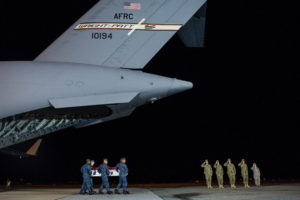Brian Castner calls it a Forever War.
The man knows war when he sees it. He is former explosive ordnance disposal officer who has written a provocative and thoughtful op-ed article for the New York Times.
Indeed, Castner tells a sad tale of Americans who are likely going to die or suffer grievous wounds in a war being fought in multiple countries, on multiple fronts, against multiple enemies who likely cannot be eradicated.
This war began, for all intents, on that glorious Tuesday morning, Sept. 11, 2001. Terrorists flew airplanes into the World Trade Center in New York, into the Pentagon in Washington, D.C., and fought with passengers aboard a third jetliner before it crashed into a Pennsylvania field.
President Bush gathered his national security team and in short order sent military forces into Afghanistan to kill the individuals responsible for that heinous act.
The war was on.
Many of us worried at the time — while supporting the president’s decision to retaliate — about whether there ever could be a way to win this war. Could we ever declare victory and then bring all our troops home? Many of us are old enough to remember when the late, great Republican senator from Vermont, George Aiken, thought we could do just that in Vietnam: “Let’s just declare victory and go home,” Sen. Aiken said.
The answer, nearly 16 years later, is “no.” We cannot make such a declaration about the Forever War.
Castner’s essay centers on the death of a 42-year-old sailor, Scott Dayton, who became the first American to die in combat in Syria. Castner’s Forever War has now expanded to that country, where we are working with Syrian resistance forces against the government of Bashar al Assad and against the Islamic State.
Castner writes: “The longest conflict in American history — from Afghanistan to Iraq, to high-value target missions throughout Africa and the Middle East — has resulted in the nation’s first sustained use of the all-volunteer military, wounding and killing more and more service members who resemble Scotty: parents, spouses, career men and women.”
Then he writes: “The Forever War is unlikely to end soon, and for those not in the military, continued voluntary service in this perpetual conflict can be hard to understand. Popular explanations — poor outside job prospects, educational enticements, the brashness of youth — don’t hold up under scrutiny.”
I would challenge only this: A war that lasts “forever” not only won’t “end soon,” it will never end.
We have taken a long march down the road to a sort of “new normal” when it comes to modern warfare. President Bush’s decision to go to war in Afghanistan was righteous, given what al-Qaeda — based in that desolate nation — had done to us. Then he expanded that fight into Iraq, a nation that had nothing to do with the 9/11 attacks; the president and his team concocted some scenario about weapons of mass destruction. They were tragically, horribly wrong.
Barack Obama continued the fight and has handed it off to Donald Trump.
This interminable war has expanded now to several nations. How does it end? How do we know when we’ve killed the last bad guy?
Think of it as our nation’s internal fight against hate groups such as the Ku Klux Klan. How do we remove the last Klansman? How do we persuade the KKK to give up its hate, to stop intimidating Americans?
Accordingly, how do we know when the last international terrorist who’ll ever pick up arms against us has been taken down? We cannot know any of it.
Yet this Forever War continues.
And I fear that it will continue … forever.
